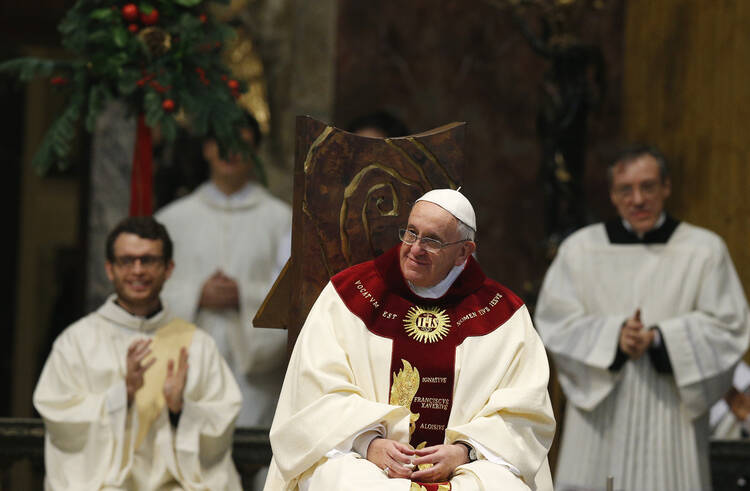A guest blog from Michael Rogers, S.J., a Jesuit priest living in Rome:
Today I met a man that, in nine short months, has become one of my heroes. He ambled into the chapel where I would normally celebrate mass at the same time on any normal Friday, and somehow disarmed us all in moment that should have been nerve-wracking. We were to meet a man that most of us believe to be Christ’s vicar on earth, and yet we were set at ease by being in the presence of a man who called himself our brother. Today I met one of my heroes, and in the few short words that we exchanged I was left deeply consoled. I was consoled not by the “Buon Giorno” that passed between us, but by being in the presence of a man whose many actions have over the course of the past nine months challenged me not just to be a better priest, or a better Jesuit, but a better man. Today I met Pope Francis and I understood, in the one of the fullest and richest senses that I ever have in my life, what a hero really is.
There is a song written by Bonnie Taylor in 1984 in which she lists all of the qualities of a hero, that they should be strong, fast and fresh from the fight. What about a hero, though, who paces himself slowly, is often helped up steeper stairs, and asks that enemies recognize that they are brothers in a world all too often at war? We look to superheroes as archetypes of heroes, those who possess supernatural strength and fill our comic books and even our biblical narratives; men and women who consistently subvert the natural order. There are those heroes of classical antiquity who, like Odysseus of Greek myth and Cú Chulainn of Celtic legend, are humans who overcome inconceivable odds. What about a hero who is simply a man, walking amid other men, who neither flies nor faces a cyclops, who is neither skilled in the marital arts, nor inspires such fear that his enemies would even fear approaching him after his death? How do we make sense of a hero outside of such a narrative?
The truth may well be simply in that great quest for integrity, in that great existential pull that each of us, believer and nonbeliever alike, feel. The answer may be that in Pope Francis many of us see what we hope to be ourselves. Not the pope, not a bishop, not a religious figure, but a man who is radically free because he is a man of radical integrity. We see in Pope Francis a man who is radically courageous because he is not afraid to admit his faults, but all the more not afraid to pull us forward in his own attempts to be free down to the very fundament of his being. This is not the übermensch of Nietzsche, nor is it even the existential knight of faith of Kierkegaard. In Francis we see something that we can all hope to reasonably obtain, not an ideal, not a theory, but a man who is radically free, joyful but substantive, and a populist who is not afraid to be intelligent. In short, in Pope Francis we see a man who is, at least as far as we have seen, radically, courageously and unabashedly human. Being himself has made him a hero. For those of us who struggle often enough simply to be ourselves, it has made him someone who gives us hope.
Today I met one of my heroes, and after we briefly shook hands, he offered this simple word of who I, as a Jesuit, am supposed to be. He said in his homily that a Jesuit, in following Christ, is “to think like Him, to love like Him, to see [things the way He sees them], to walk like Him – it means doing what He did, and with the same sentiments He had, with the sentiments of His heart.” In other words, as is written in the martyrdom of St. Polycarp, be strong and play the man. Be that person of integrity, be fearless enough to believe that you too could be that person that you strive to be. Today I met one of my heroes, and it seems that each day he is teaching us a bit more what it really means to be a hero.








